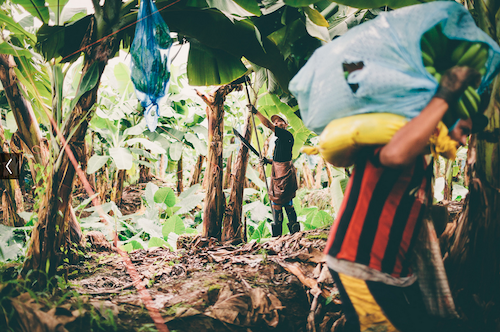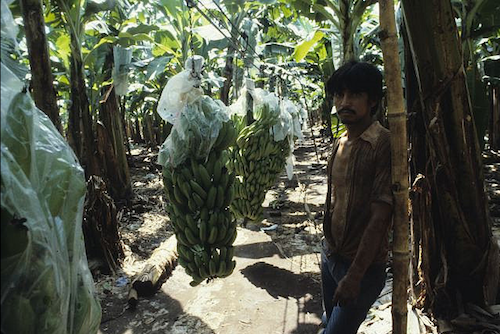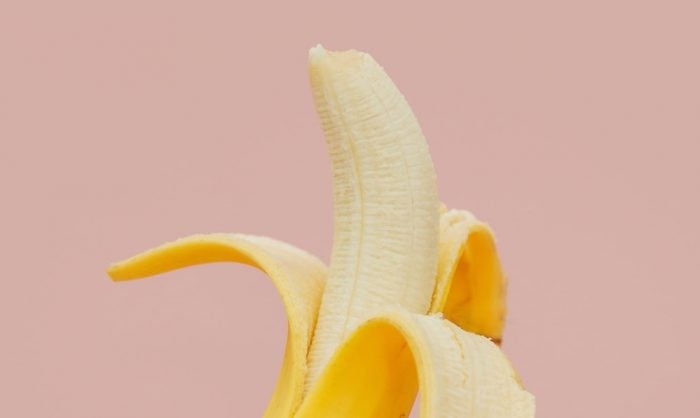“If you eat bananananas, you don’t want to know this.”
As an on-the-go student and athlete, I praise bananas for their super transportable, muscle relieving/brain reviving super-powers…not to mention affordability (thank you, Trader Joe’s trademark “19 cent banana”)!
As a raw-foods-loving, fledgling vegan I know as well as anyone that bananas are a godsend in the kitchen, used as an egg replacement or frozen as “ice-cream.” Yes, please.
But as an environmentalist who just returned from four months studying sustainability and tropical ecology in Costa Rica—
I now recognize bananas for what they really are: a social and biological nightmare.
~
~
Before you read on, watch this two-minute clip that shows just a slice of the shameful history of Chiquita, the largest banana producer in the world:
Yikes!
I’ll admit that the smug, glass-clinking cheers to the massacre of 1,000 innocent people at the end added unnecessary bias (did I mention it was a clip from a movie titled Bananaland: Blood, Bullets and Poison? You can probably guess what their agenda is), but hang tight.
I promise five, unbiased reasons why we should all refuse to support the banana industry (no matter how cheap, delicious and nutritious bananas may be…gulp).
Let’s fast forward to present-day banana production and consumption.
96 percent of Americans eat bananas, and the average American eats 26 lbs of bananas every year, which is twice the amount of any other fruit.
Chiquita and its bedfellows have clearly done their job: banana reigns king in the US.
Here are the reasons I’m calling for a coup:
~
~
1. Health Consequences:
Sure, each bite of banana might provide heart-healthy, potassium-rich goodness…but it is eaten at the expense of the health of children, adults and entire communities in Central and South America.
According to the 2011 Barraza et al. case-study about pesticides in banana production in Costa Rica (the third largest banana exporting country in the world), exposure is leaving communities sick and dying.
Ranging from the classic Pepto-Bismol list of symptoms to rashes, contact dermatitis, allergies, neuro-developmental effects, endocrine disrupting effects, sterilization, cancer, and death—banana pesticide exposure can have dramatic effects (24,000 workers in Central America have been sterilized due to exposure to the toxic chemical DBCP).
Aerial spraying disregards barriers, and in some cases plantations surround schools and neighborhoods.
The children, clotheslines and rooftops (from which many families collect rainwater for drinking) regularly become coated in toxic chemicals.
The grueling plantation work often falls on the backs of migrant workers who are forced to rate wages on a piece-meal basis, but who have 12 hour work days, six or seven days a week which are spent body-deep in chemicals and dangerous working conditions (although many are only compensated for eight hours spent in the fields).

To add insult to injury, their migrant status effectively blocks them from joining unions so they cannot petition for improved working conditions and do not have access to healthcare plans.
2. Environmental Abuses:
Bananas for export are grown on massive monoculture plantations (Costa Rica alone has dedicated roughly 125,000 acres to production).
Biologically speaking, monoculture is an inherently unsustainable practice. It is a chemical, fossil fuel and water intensive production method that depletes soil, destroys waterways and devastates biodiversity.
Unfortunately, banana plantations are monocultures on steroids.
There is only one species of banana grown for international trade (yes, you heard correctly) and because it is seedless, it must be propagated using shoots.
In other words, all bananas are exact, biological clones of one another.
These growing conditions make bananas extremely vulnerable to disease transmission.
The solution? Receive an extra-scary, extra-grande dose of chemicals (we’re talking the banned, the bad and the ugly: DDT, dieldrin, mirex, heptachlor, paraquat and over 400 other agrochemicals. Are you freaked out yet?) which bio-accumulate and devastate waterways and wildlife as well as human health (see #1).
Lack of government infrastructure in banana-exporting Central and South American countries means that there is little oversight of production methods.
Often times, aerial sprays overshoot plantations and hit waterways or rainforest—completely changing ecosystems.
Sedimentation and erosion of chemical-laced soil are suffocating our planet’s all-important coral reef and mangrove systems.
Did I mention the blue, plastic bags that are impregnated (that word freaks me out) with insecticides and placed around every single bunch of bananas? (I always try to use reusable bags when I grocery shop, little did I know that the bananas I once bought were grown in a bag, ugh…so much for feeling eco-chic).

They are often found littering streets and stream beds in banana production regions, and have been found in the stomachs of fish, sea turtles and birds.
I’m not going to address the carbon cost of processing, transport and storing, but as you can imagine—it’s high.
3. Economic Issues:
The multinationals like Dole and Chiquita are incredibly powerful, often times having more available income than the host-countries’ entire gross domestic product.
The social and political clout of these multinationals makes it nearly impossible to change laws in favor of environmental protection and workers’ rights.
Self-sufficient farms that once grew a variety of crops are now bought and paid for by companies like Dole and Chiquita. Families have become food insecure, and now must import their food staples.
Also, because the bananas pass through so many different hands on their way to our shopping carts, the plantation workers, often living below the poverty line, suffer the greatest wage theft.
“More often than not plantations receive only five cents from every dollar [spent on bananas], which is then divided up, and as a result, workers are being paid shockingly low wages.” ~ Rebecca Cohen, author of “Global Issues for Breakfast: The Banana Industry and its Problems” (2009)

Because bananas are grown for export, money that would otherwise be invested in Central and South American countries is lost to the foreign corporations and communities.
These facts beg the question: How much are we not paying for when we buy the 19 cent bananas?
4. Corporate Corruption:
Chiquita still plays dirty, and is currently in the hot-seat for spending hundreds of thousands of dollars to block the 9/11 Victims Bill, a subset of the Justice Against Sponsors of Terrorism Act (JASTA) which would expand “liability against those that had funded terrorists” aka expand liability to Chiquita.
5. The alternatives (read: Rainforest Alliance, Organic) aren’t solutions:
Sure, Chiquita has two Rainforest Alliance certified plantations, but that means nothing more than they recycle the blue bags and have stricter chemical controls.
The certification does nothing to protect against worker rights, and still allows for massive erosion, biodiversity loss and coral reef sedimentation.
Nothing is changed with regards to the energy intensive production and transportation methods.
Because bananas are so evolutionarily volatile, the costs associated with large-scale organic production is high. Plantations must often be abandoned after pest/disease outbreak which leaves hundreds of thousands of acres fallow each year.
Unless you live in the tropics where you can have a banana plant shading your back patio, the time has come to boycott bananas (although in a few years, we may not have a choice).
Ignorance is bliss, but knowledge is power.
Let us continue asking questions and use our purchasing power to create a more sustainable, and sane future. I think even Carmen Miranda would agree.

Ain’t no thang. Bananas only provide about 12 percent, which is less than half the amount found in the average avocado (which has a whopping 28 percent).
Or you could get 22 percent in half a cup of dried apricots. Heck, a baked potato provides 26 percent!
For more potassium-rich alternatives, check here.
Now promise me that this is as close as you’ll ever get to a banana again.
Relephant Bonus:
Relephant:
Why Choosing a Fair Trade Banana is an Act of Love
~
Love elephant and want to go steady?
Sign up for our (curated) daily and weekly newsletters!
Author: Emma Ruffin
Editor: Catherine Monkman
Photos: Ted McGrath/Flickr, BananaLink/Flickr, Rosilyne/Flickr, Marko Vesterinen/Flickr, Marcelo Montecino/Flickr
Facebook is in talks with major corporate media about pulling their content into FB, leaving other sites to wither or pay up if we want to connect with you, our readers. Want to stay connected before the curtain drops? Get our curated, quality newsletters below!
Bonus: The Dark Truth About Bananas (youtube.com)
Image: Charles Deluvio/Unsplash
 Share on bsky
Share on bsky



Read 62 comments and reply